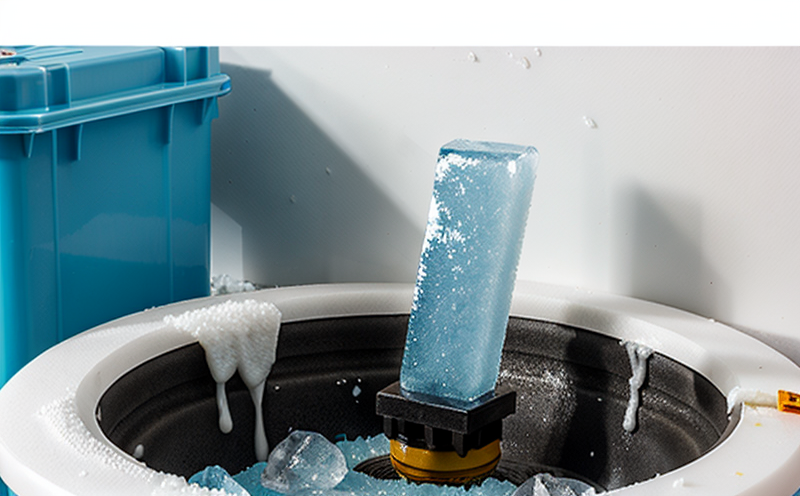Unlocking Material Durability The Importance of Freeze-Thaw Testing in Industry
As industries continue to evolve and innovate, the need for reliable materials that withstand harsh environmental conditions has become increasingly crucial. One such material characteristic is freeze-thaw resistance, which determines a substances ability to resist damage caused by repeated cycles of freezing and thawing. This laboratory service, provided by Eurolab, is essential for businesses seeking to ensure their products or infrastructure can withstand the rigors of extreme temperatures.
What is Freeze-Thaw Testing?
Freeze-thaw testing involves subjecting materials to controlled temperatures between -18C and 40C (0F and 104F), simulating real-world exposure conditions. This process helps manufacturers and engineers assess a materials durability, integrity, and performance in the face of temperature fluctuations.
Why is Freeze-Thaw Testing Essential for Businesses?
Investing in freeze-thaw testing services can significantly benefit businesses across various sectors, including
Construction Ensure that building materials, such as concrete, asphalt, or roofing materials, can withstand freeze-thaw cycles.
Infrastructure development Validate the performance of roads, bridges, and other structures under extreme temperature conditions.
Manufacturing Assess the durability of packaging materials, pipes, or equipment components exposed to freezing temperatures.
Research and Development Freeze-thaw testing helps scientists and engineers develop new materials with improved thermal resistance.
Key Benefits of Freeze-Thaw Testing
Here are some compelling reasons why businesses should consider freeze-thaw testing
Improved Durability By simulating real-world conditions, companies can identify potential material weaknesses and make informed decisions to enhance product durability.
Reduced Maintenance Costs Identifying materials that withstand freeze-thaw cycles helps reduce maintenance expenses by minimizing the need for repairs or replacements.
Enhanced Safety Freeze-thaw testing ensures that products meet industry standards, reducing the risk of accidents and injuries caused by material failures.
Compliance with Regulations Compliance with regulatory requirements is ensured through rigorous testing procedures, mitigating potential fines and penalties.
Increased Customer Satisfaction By offering high-quality materials that resist freeze-thaw damage, businesses can build trust with customers and maintain a competitive edge in the market.
Cost Savings Freeze-thaw testing helps companies save money by identifying cost-effective solutions, optimizing material selection, and minimizing waste.
Freeze-Thaw Testing Capabilities
Eurolabs state-of-the-art facilities are equipped to handle freeze-thaw testing for various materials, including
Concrete
Asphalt
Roofing materials
Packaging materials
Plastics
Ceramics
Comprehensive Freeze-Thaw Testing Process
Our team of experienced professionals follows a rigorous testing protocol, ensuring accurate and reliable results. The process includes
Material Preparation Samples are carefully prepared to simulate real-world conditions.
Temperature Control Specified temperatures between -18C and 40C (0F and 104F) are maintained during the test cycle.
Monitoring and Data Collection Results are recorded using advanced software, providing a detailed analysis of material performance.
QA Section
Weve compiled some frequently asked questions about freeze-thaw testing to help you better understand this essential laboratory service
Q What types of materials can be tested for freeze-thaw resistance?
A Our facilities can test various materials, including concrete, asphalt, roofing materials, packaging materials, plastics, and ceramics.
Q How long does the freeze-thaw testing process take?
A The duration depends on the specific material and test requirements. However, our team typically completes tests within 7-14 days.
Q Can I observe the testing process in real-time?
A Yes, you can arrange for on-site observation to witness the freeze-thaw testing procedure firsthand.
Q How accurate are the results from freeze-thaw testing?
A Our advanced equipment and rigorous testing protocol ensure highly reliable results. We provide detailed reports and recommendations based on our findings.
Conclusion
In todays fast-paced industry, its crucial for businesses to prioritize material durability and performance. Freeze-thaw testing is an essential laboratory service that helps companies ensure their products or infrastructure can withstand extreme temperatures. By investing in Eurolabs freeze-thaw testing services, youll gain valuable insights into material behavior, enabling informed decision-making and ultimately driving business success.
Dont compromise on product quality or customer satisfaction choose Eurolab for your freeze-thaw testing needs.
-
Simulating the effects of repeated freeze-thaw cycles on construction materials
-
Testing materials for their ability to withstand the expansion and contraction caused by freezing and thawing
-
Ensuring that concrete, brick, and stone retain their integrity when subjected to freezing temperatures followed by thawing
-
Evaluating the ability of materials to resist cracking, spalling, or delamination after freeze-thaw exposure
-
Testing how materials like asphalt and cement react to temperature fluctuations and freezing water
-
Simulating winter conditions to assess how materials perform in regions with extreme cold and fluctuating temperatures
-
Ensuring that construction materials maintain their strength and structure when exposed to freeze-thaw conditions
-
Testing the resistance of waterproofing and sealant materials to freeze-thaw cycles
-
Verifying that construction materials used in roads, bridges, and pavements are resilient to freeze-thaw damage
-
Simulating the effects of wetting and drying, combined with freezing and thawing, on construction materials
-
Testing for the ability of materials to resist moisture absorption and freezing-related damage
-
Evaluating the durability of materials used in exterior applications such as roofing, facades, and pavements under freeze-thaw conditions
-
Ensuring that materials used in foundations and basements are resistant to water infiltration and freeze-thaw cycles
-
Verifying that materials used for building envelopes can resist cracking, erosion, and damage from freezing conditions
-
Testing how freeze-thaw cycles affect materials used in high-altitude or northern climates
-
Simulating freeze-thaw cycles in combination with other environmental stresses to assess material resilience
-
Testing for changes in the dimensional stability of materials when exposed to freezing and thawing
-
Verifying the performance of materials used in landscaping and exterior finishes after freeze-thaw exposure
-
Ensuring that frozen soil and other environmental factors do not damage foundation materials during freeze-thaw cycles
-
Testing the ability of materials to resist degradation due to the crystallization of moisture within the material during freezing
-
Simulating the effects of repeated freeze-thaw cycles on materials in coastal areas where saltwater may accelerate deterioration
-
Testing the performance of thermal insulation materials under freeze-thaw conditions




